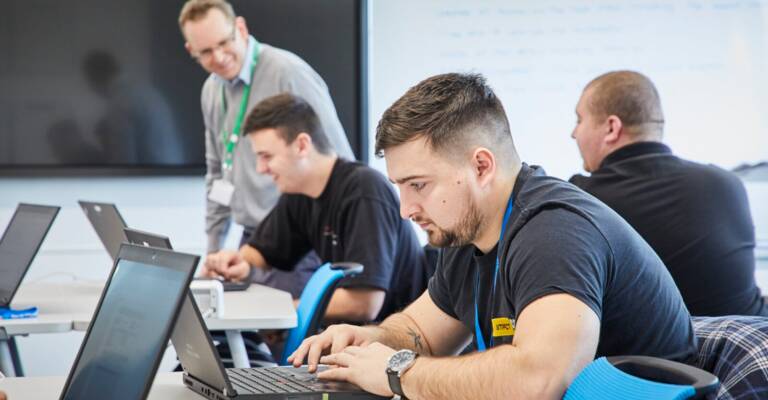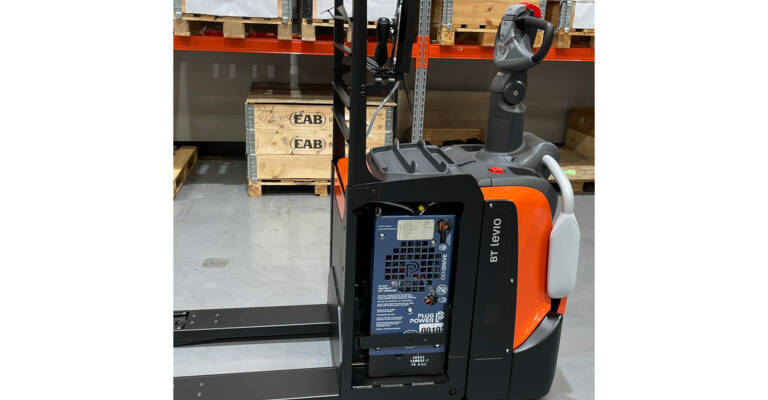Toyota's hydrogen-powered truck is the perfect model for MIRA Technology Institute

A centre of excellence for emerging technologies
The purpose-designed facility is the result of a unique collaboration led by North Warwickshire and South Leicestershire college (NWSLC), and its partners, HORIBA MIRA, Coventry University, the University of Leicester and Loughborough University. It’s regarded as a center of excellence and delivers accredited programmes in emerging areas such as Autonomous vehicles and electrification for professionals of all levels - from apprentices to chartered engineers.
Hands-on skills training is delivered in fully equipped workshop spaces that create a ‘live’ industry environment. The workshops are configured to meet the demands of diverse training sessions, which often means shifting heavy and cumbersome automotive parts as well as complete cars into positions where they can be easily and safely accessed and studied by the students.
In line with the MTI’s steps to become a Hydrogen training centre of excellence and to support the Institute’s day-to-day operations The MTI has acquired a hydrogen-powered Toyota Levio LPE 220 powered pallet truck.

Embracing hydrogen technology
The Levio LPE 220 is usually powered by a lead acid or Lithium-Ion battery but, to meet the MTI’s sustainability plans and double up as a new hydrogen training demo tool for courses, the truck was ordered with a hydrogen fuel cell.
The hydrogen fuel cell containing the stack and hydrogen tank is located where the lead-acid battery would normally be.
With a 2.2 tonne load capacity the hydrogen-powered Levio LPE 220 takes just 2-3 minutes to fully refuel and gives off zero emissions.
The MIRA Technology Park is in the process of installing the infrastructure needed to produce and store hydrogen on site A hydrogen electrolyser system will be used to convert energy from the sun's rays into the hydrogen needed to power the truck’s fuel cells. This means that 100 per cent of the hydrogen the MTI need to run the truck will come from onsite renewable sources.
Enhancing training with Toyota's hydrogen powered truck
Amongst a full offer of Emerging technology courses in Electric vehicles, Connected Autonomous Vehicles and Automotive safety systems the MTI offer several ‘Excellence in Hydrogen’ workshops that show logistics operators how to make their business ‘hydrogen ready’ and the Toyota powered pallet truck will be used by lecturers as a visual aid to help demonstrate fuels cell technology.

The future of hydrogen in material handling technology
Craig Line, NWSLC’s Emerging Technology Manager, says: “We plan to develop hydrogen training specifically for logistics professionals who want to learn how their warehouses or distribution centres can benefit from hydrogen material handling technology as well as hydrogen vehicle awareness workshops that focus on the skills truck operators need to ensure that they use the new technology efficiently and safely. Having the Toyota hydrogen pallet truck in our workshop helps lecturers clarify concepts and communicate information to students very effectively.”
Phil Tunney, Toyota Material Handling’s Hydrogen Product Manager, commented: “Toyota’s experience with hydrogen-powered forklifts goes back nearly two decades. Toyota Hydrogen fuel cell- forklifts have been in operation at sites across the Nordic region and Europe as well as Australia for several years. And, of course, in the automotive sector the Toyota Mirai is at the forefront of a new age of hydrogen fuel cell cars that deliver long distance zero-emissions driving.”
